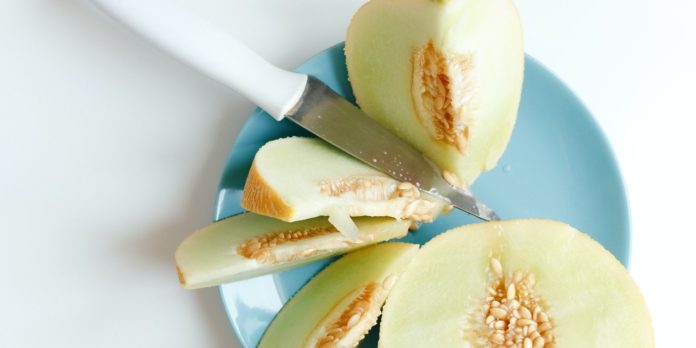What Is Golden Melon?
The golden melon, also known as honeydew melon, is a melon species that has given rise to a plethora of cultivated varieties. It is a large, bright yellow melon with a pale green to white inner flesh. The golden melon, botanically known as cucmumis melo, originated in Europe and Africa before spreading to the rest of the world. It is distinguished by its bright golden-colored firm skin and succulent juicy sweet flesh. Due to its high numerous medicinal and nutritional benefits, golden melon is extremely beneficial to us.
10 Health Benefits of Golden Melon
Highly Nutritious
Vitamin C, pantothenic acid, calcium, zinc, vitamin B6, fiber, magnesium, iron, potassium, vitamin A, and omega-3 and 6 fatty acids are among the vital minerals and nutrients found in golden melon. According to research, these vitamins are critical for the proper functioning of our body systems. Vitamin B6 aids in the production of serotonin in our bodies. Serotonin is a chemical that functions as a neurotransmitter, relaying signals from one area of the brain to another. This signal affects brain cells, influencing how we feel, sleep, behave, and eat. It also influences our memory, sexual desire, and how our body regulates its temperature.
Regulates Blood Pressure
 Because of the potassium content, golden melon aids in the regulation of blood pressure. According to research, potassium releases signals within the body that help to stimulate and regulate nerve and muscle contractions. As a result, our nerves, blood vessels, and muscles rely heavily on this vitamin for proper functioning and normal blood pressure.
Because of the potassium content, golden melon aids in the regulation of blood pressure. According to research, potassium releases signals within the body that help to stimulate and regulate nerve and muscle contractions. As a result, our nerves, blood vessels, and muscles rely heavily on this vitamin for proper functioning and normal blood pressure.
Prevents Cardiovascular Diseases
The serotonin released in the body helps to convert homocysteine and amino acids into important compounds, thanks to the high amount of vitamin B6 in golden melon. This is critical, since elevated homocysteine levels have been linked to cardiovascular disease in studies. Golden melon contains omega 3 and omega 6 fatty acids, which help to keep the heart healthy.
Maintains Bone Health
The minerals folate, vitamin K, and magnesium found in honeydew melon are all important for mending and maintaining strong bones. The melon, in particular, is a significant source of folate, with 1 cup (177 grams) supplying 8% of the RDI. Folate is required for the breakdown of homocysteine, which has been related to a decrease in bone mineral density over time. Vitamin K is required for the formation of osteocalcin, a significant structural protein in bone. As a result, adequate vitamin K intake is critical for bone health. Honeydew offers 6% of the RDI for this vitamin in a single serving.
In addition, one serving of honeydew provides roughly 4% of your daily magnesium requirements. Magnesium is required for the normal operation of the cells that create and break down bone tissue. As a result, magnesium is an important vitamin for bone health. Honeydew also includes trace levels of calcium, phosphorus, and zinc, all of which are beneficial to bone health. While these nutrients are not highly concentrated in honeydew, including the fruit in your diet can still benefit your bone health when combined with a well-balanced diet rich in other nutrient-dense foods.
Prevents Constipation
The soluble and insoluble fiber content of golden melon is excellent. This fruit’s high dietary fiber content makes it an excellent aid to simple digestion and the prevention of constipation. Fiber also aids in the removal of undesirable materials from the digestive tract, minimizing the occurrence of gastrointestinal disorders.
Rich in Water and Electrolytes
Water is probably the first thing that comes to mind when you think of hydration. However, in order to hydrate effectively and properly, your body requires more than just water; it also requires electrolytes. Honeydew melon is mostly water and contains electrolytes like potassium, magnesium, sodium, and calcium. Honeydew’s combination of water and nutrients makes it ideal for rehydrating after a workout, during illness, or simply staying hydrated throughout the day.
Promotes Healthy Skin
With its high vitamin C content, honeydew melon may promote healthy skin. Adequate vitamin C intake is required for the proper production of collagen, a major structural protein required for the repair and maintenance of skin tissue. Furthermore, because vitamin C is a potent antioxidant, some research suggests that it may protect your skin from sun damage. Honeydew melon is high in vitamin C, with a single cup (177 grams) providing 53% of the RDI. Though vitamin C can be obtained from a variety of foods, eating honeydew is a quick way to meet your daily requirements while also promoting healthy skin.
Supports Eye Health
Honeydew melon is high in two antioxidants: lutein and zeaxanthin. These carotenoid compounds are well known for promoting eye health and preventing age-related vision loss
According to research, eating foods high in antioxidants, such as honeydew melon, on a regular basis, may help you maintain proper eye function throughout your life.
Boosts Immune Health
Vitamin C is great for immune function, and honeydew melon is rich in this vitamin. The human immune system is complex and requires a wide range of nutrients to function properly; vitamin C is one of these nutrients. Research suggests that an adequate intake of dietary vitamin C may both prevent and treat a variety of respiratory and systemic infections, including pneumonia and the common cold.
Easy to Incorporate into Diets
 It couldn’t be easier to incorporate honeydew melon into your diet. It is widely available, and its price is comparable to other popular melons such as cantaloupe or watermelon. Choose a ripe melon to make this dietary endeavor worthwhile. Honeydew melons that are out of season or unripe leave a lot to be desired in terms of flavor. A great selling point for this fruit is that it can be eaten on its own. A slice of cool, ripe melon on a hot day is difficult to beat. If you want to be a little more creative, there are many other ways to enjoy this fruit. Honeydew melon can be used in a variety of recipes, including smoothies, desserts, soups, and salads.
It couldn’t be easier to incorporate honeydew melon into your diet. It is widely available, and its price is comparable to other popular melons such as cantaloupe or watermelon. Choose a ripe melon to make this dietary endeavor worthwhile. Honeydew melons that are out of season or unripe leave a lot to be desired in terms of flavor. A great selling point for this fruit is that it can be eaten on its own. A slice of cool, ripe melon on a hot day is difficult to beat. If you want to be a little more creative, there are many other ways to enjoy this fruit. Honeydew melon can be used in a variety of recipes, including smoothies, desserts, soups, and salads.
10 Facts to Know About Golden Melon
- The golden melon, also known as sweet melon, is scientifically known as Cucumis melo and is a member of the Cucurbitaceae family.
- The fruit tastes like a combination of apple, melon, and guava. Yes! It is simply a complete package of fruit with an unfathomable flavor.
- The skin is edible, similar to that of a cucumber, as opposed to watermelon, whose skin edibility is debatable.
- This melon fruit is slightly egg-shaped and has a smooth, waxy yellow rind/skin, creamy white flesh, and seeds.
- It contains approximately 90% water and thus hydrates the body extremely well. It contains potassium, which, according to current research, releases signals that help to stimulate and regulate the body’s nerves and muscle contractions.
- Golden melon seeds can be dried (for a quick snack), roasted, or ground into seed oil. As a result, all components are usable. Seeds are also planted in order for fruit to grow.
- It smells slightly like the wild mango of Nigeria’s southwest, known as “Oro,” and its seeds are useful when making ogbono soup.
- Vitamin C, pantothenic acid, calcium, zinc, vitamin B6, fiber, magnesium, iron, potassium, vitamin A, and omega-3 & 6 are all found in golden melon.
- Due to its high levels of vitamin B6 and Omega 3 & 6, the fruit helps to prevent cardiovascular disease.
- It also helps to prevent constipation due to its high fiber content. It is beneficial for maintaining a healthy weight and controlling cholesterol.
Now that you Know…
Honeydew melon is a sweet fruit that grows all over the world. The flesh is light green, and the rind is usually white or yellow. Honeydew is high in vitamins, minerals, and other plant compounds that promote health. Eating this type of melon may have a number of health benefits, owing to its high nutrient content. One can eat it on its own or as part of a variety of other dishes such as soups, salads, smoothies, and more. Choose an in-season, ripe melon for the best flavor.




